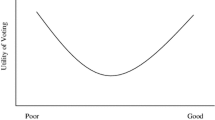Abstract
Analysts and commentators have long regarded midterm congressional elections as an interim evaluation of the president. Recent research has emphasized the effect of the individual qualities of congressional candidates on the vote. Both factors contributed to the 1982 congressional vote. However, the relative success of the Republican party in 1982 was made possible by the unwillingness of a majority of the electorate to attribute the country's economic problems to the administration. This attribution factor, implicitly ignored in most analyses of the effect of the economy on vote choices, is examined here.
Similar content being viewed by others
References
Achen, Christopher (1979). The bias in normal vote estimates.Political Methodology 6(May): 343–356.
Arcelus, Francisco, and Metzer, Allan H. (1975). The effect of aggregate economic variables on congressional elections.APSR 69(Dec.): 1232–1239. (Read the comments and rejoinders.)
Bloom, H., and Price, H. (1975). Voter response to shortrun economic conditions: the asymmetric effect of prosperity and recession.APSR 69(December): 1240–1254.
Burnham, Walter Dean (1975a). American politics in the 1970s: beyond party? In William Nisbet Chambers and Walter Dean Burnham (eds.),The American Party Systems: Stages of Development. New York: Oxford University Press.
Burnham, Walter Dean (1975b). Insularity and responsiveness in congressional elections.Political Science Quarterly 90(Fall): 411–435.
Calvert, Randall L., and Ferejohn, John A. (1983). Coattail voting in recent presidential elections.APSR 77(June): 407–419.
Campbell, Argus (1966). Surge and decline: a study of electoral change. In A. Campbell et al. (eds.),Elections and the Political Order, pp. 40–62. New York: Wiley.
Converse, Philip E. (1966). The concept of a normal vote. In A. Campbell et al. (eds.),Elections and the Political Order, pp. 9–39. New York: Wiley.
Erikson, Robert (1971). The advantage of incumbency in congressional elections.Polity (Spring): 395–405.
Feldman, Stanley (1982). Economic self-interest and political behavior.AJPS 26(August): 446–466.
Fiorina, Morris P. (1977). The case of the vanishing marginals: the bureaucracy did it.APSR 71(March): 177–181.
Fiorina, Morris P. (1981).Retrospective Voting in American National Elections. New Haven: Yale University Press.
Gurin, Patricia, and Epps, Edgar G. (1975).Black Consciousness, Identity, and Achievement. New York: Wiley.
Heider, F. (1944). Social perception and phenomenal causality.Psychological Review 51: 358–374.
Heider, F. (1958).The Psychology of Interpersonal Relations. New York: Wiley.
Jacobson, Gary C., and Kernell, Samuel (1981).Strategy and Choice in Congressional Elections. New Haven: Yale University Press.
Kernell, Samuel (1977). “Presidential popularity and negative voting.”APSR 71(March): 44–66.
Kiewiet, D. Roderick (1982).Macroeconomics and Micropolitics: The Electoral Effects of Economic Issues. Chicago: University of Chicago Press.
Kramer, Gerald (1971). Short-term fluctuations in U.S. voting behavior, 1896–1964.APSR 65(March): 131–143.
Kramer, Gerald (1983). The ecological fallacy revisited: aggregate vs. individual findings on economics and elections and sociotropic voting.APSR 77(March): 92–111.
Mann, Thomas E., and Wolfinger, Raymond E. (1980). Candidates and parties in congressional elections.APSR 74(September): 617–632.
Mayhew, David R. (1974). Congressional elections: the cases of the vanishing marginals.Polity 6(Spring): 295–317.
Moser, Charles A. (1981). Watershed and ratifying elections: a historical view of the 1934 and 1954 midterm congressional elections. Unpublished paper.
Mueller, John (1970). “Presidential popularity from Truman to Johnson.”APSR 64(March): 18–34.
Mueller, John (1973).War, Presidents, and Public Opinion. New York: Wiley.
Norpoth, Melmut, and Yartek, Thom (1983). Macroeconomic conditions and fluctuations of presidential popularity: the question of lagged effects.AJPS 27(November): 785–807.
Petrocik, John R. (1981). Voter turnout and electoral oscillation.American Politics Quarterly 9(April): 161–180.
Tufte, Edward (1975). Determinants of the outcome of midterm congressional elections.APSR 69(September): 812–826.
Witt, Evans (1983). A model election?Public Opinion 5(December/January): 46–49.
Author information
Authors and Affiliations
Rights and permissions
About this article
Cite this article
Petrocik, J.R., Steeper, F.T. The midterm referendum: The importance of attributions of responsibility. Polit Behav 8, 206–229 (1986). https://doi.org/10.1007/BF01002098
Issue Date:
DOI: https://doi.org/10.1007/BF01002098




